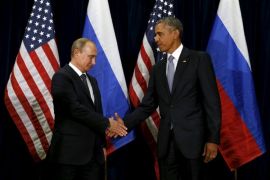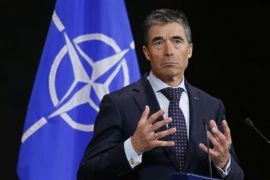NATO foreign ministers including US Secretary of State Hillary Clinton met with their Russian counterpart, Sergei Lavrov, during talks in Brussels aiming to reassure Moscow by stressing their desire to continue negotiations.
"This system does not threaten Russia. Nor does it alter the strategic balance," NATO Secretary General Anders Fogh Rasmussen said at the start of talks with the former Cold War foe.
Rasmussen had urged Russia on Wednesday to refrain from wasting money on countermeasures against an "artificial enemy." Top Russian General Nikolai Makarov warned that Moscow was "being pushed" into a new arms race.
President Dmitry Medvedev last month announced that Russia was ready to deploy intermediate range Iskander missiles in the Kaliningrad exclave that borders EU members Poland and Lithuania.
Russia later also switched on a new radar warning system against incoming missiles in Kaliningrad and said it reserved the right to strike NATO`s European shield components if its demands were not met.
British Foreign Minister William Hague said Medvedev`s threat was "disappointing" but that NATO was still willing to seek cooperation.
"NATO`s offer is on the table to Russia and we would like to see practical cooperation on missile defence go ahead," Hague told reporters ahead of the talks.
NATO and Russia have been at odds over the shield despite agreeing last year to explore ways to cooperate in the system, which Western officials insist is aimed at warding off attacks from Iran or other "rogue states."
Moscow wants its former Cold War foe to provide a legally binding document stating the system is not aimed against Russia, but NATO says it has made enough statements to that effect and that cooperation is the best solution.
NATO has also rejected Russia`s demand to build a common system that shares sensitive data and allows Moscow to have a say on when to respond to a possible attack.
NATO and the United States have sought to improve ties with Russia since President Barack Obama took office in 2009.
But US Secretary of State Hillary Clinton angered Russia this week by voicing "serious concerns" about the country`s parliamentary elections and calling for allegations of fraud and vote-rigging to be investigated.
Despite lingering suspicions between the former Cold War foes, Russia has allowed the alliance to use its territory to send vital supplies to troops in Afghanistan.
The transit route through Russia has become all the more important since Pakistan shut down supply lines in anger at a deadly air strike on the Afghan border last month that killed 24 Pakistani troops.
(Uu.H-AK)
Editor: Priyambodo RH
Copyright © ANTARA 2011




